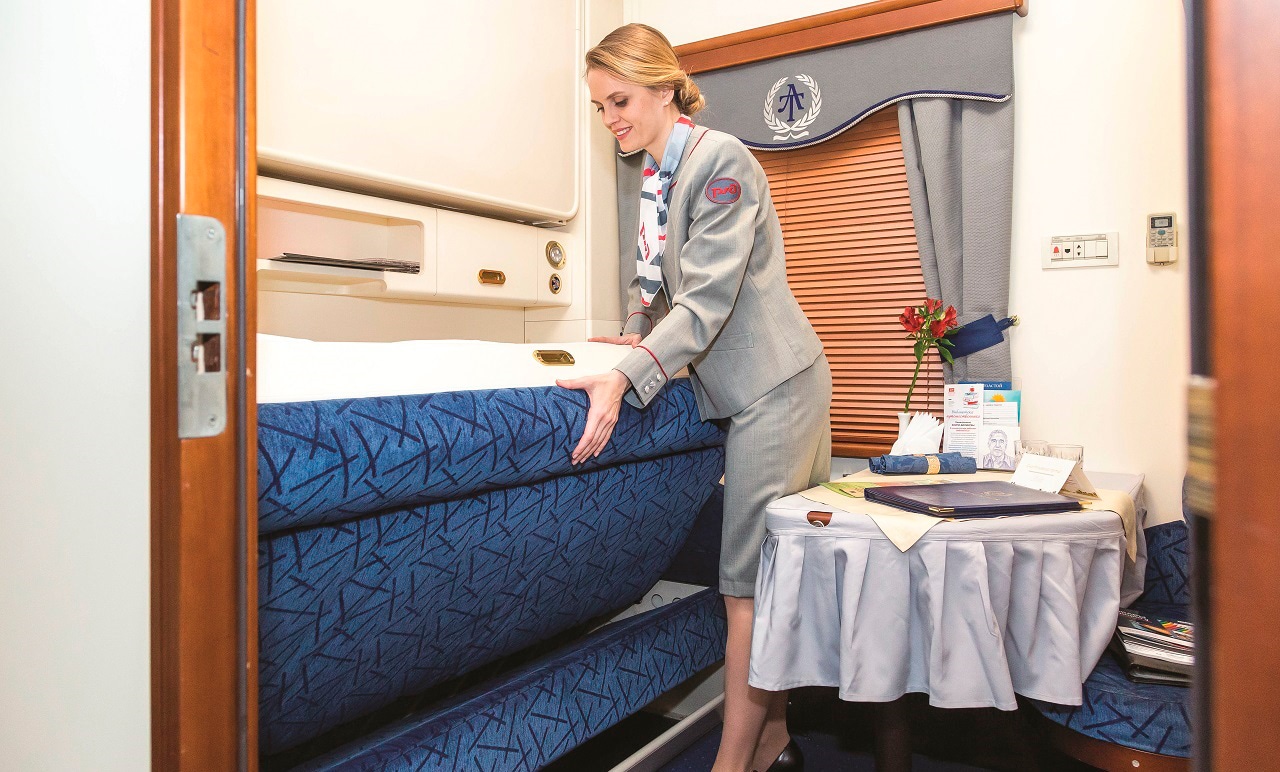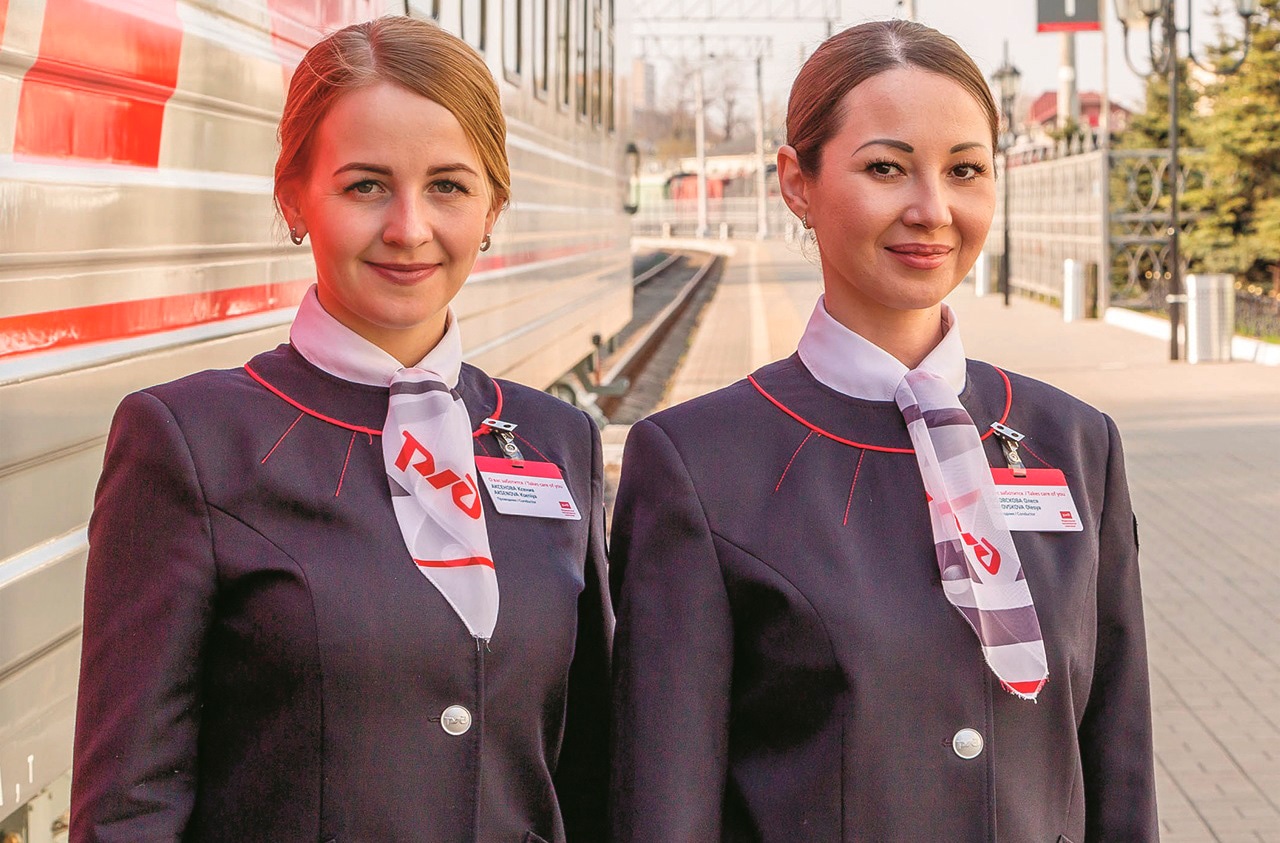Our people
FPC sees its people as a key asset and the key driver of its competitive edge.
FPC manages its human capital in a way which helps achieve its strategic goals while creating positive conditions for employees’ personal development. The key priorities of FPC’s social and HR policy are recruiting and retaining people, ensuring their continuous development, and providing them with social support.
Staff profile
FPC currently employs 60,982 people.
The majority of our employees are front line, directly serving passengers on a daily basis (37,800, or 61.9%).
Merging the Volga Branch and the Ural Branch, disbanding the South East Branch and the South Urals Branch, as well as taking organisational measures enabled FPC to decrease its employee headcount by 2.9% year-on-year.
The Company maintains a good balance between its young and more experienced employees. The average age of employees is 40 years. A 33% share of the personnel is represented by young employees aged under 35. At 65%, women constitute the majority of employees.
| Occupation | As at 31 December 2017 | As at 31 December 2018 |
|---|---|---|
| On-train services | 35,212 | 34,214 |
| Ticket sales | 6,897 | 6,593 |
| Maintenance and repair of rolling stock | 12,485 | 12,296 |
| Other | 8,177 | 7,879 |
| Total | 62,771 | 60,982 |
Personnel turnover at FPC increased by 1.1% year-to-year to 9.2% (8.1% in 2017), predominantly resulting from employee retirement and the South East and South Urals branches being disbanded on 1 April 2018. The employee stability indexCalculated as a ratio between the number of people employed at FPC for more than five years and the total employee headcount. was 67% in 2018 (68% in 2017).
Staff recruitment
FPC’s recruitment efforts are focused on two key position segments: general and managers and specialists.
FPC seeks to recruit talented people who will contribute to its ongoing development. General positions such as carriage attendant and ticket clerk are most often recruited externally. When seeking managers and specialists, FPC focuses on internal candidates, with only rare or unique professionals recruited externally to fill the vacancies within this position segment.
Candidates undergo various assessment procedures during the recruitment process: interviews, vocational tests, personal surveys, and skills tests. Candidates are assessed in accordance with the 5C+L corporate competence model:
- Competence – possessing professional skills, ability to learn and develop, willingness to share experience and knowledge
- Customer focus – focus on delivering value to FPC’s customers
- Corporate culture and ownership – ocus on FPC’s needs, teamwork, focus on results
- Quality and safety – focus on quality and performance. Safety assurance
- Creativity and drive for innovation – proposing initiatives and implementing innovations, supporting others’ initiatives
- Leadership – motivating and engaging other employees, motivating and influencing without administrative pressure.
Over 20,500 employees underwent the corporate competence assessment during the year, with front-line employees accounting for 89% of the total.
Personnel training and development
FPC has in place an effective personnel training and development system, through which 19,000 employees, or 31% of FPC’s total headcount, underwent training in 2018.
| Indicators | 2015 | 2016 | 2017 | 2018 |
|---|---|---|---|---|
| FPC headcount, people | 67,677 | 65,928 | 62,771 | 60,982 |
| Total employees trained, people | 21,787 | 18,853 | 19,287 | 19,008 |
| Share of employees trained at FPC’s Corporate Staff Training Centre, % | 41 | 48 | 48 | 62.7 |
| Budget, RUB million | 97.5 | 86.9 | 96.3 | 118.2 |
Key areas covered by personnel training courses:
- modern technological maintenance and repair processes for passenger carriages
- design specifics, operation, maintenance, and fault diagnostics of systems and assemblies in double-decker carriages
- transport safety and security
- building a culture around safety and traffic safety management in passenger services
- MBA in Managerial Economics
- induction training using the TWI (Training Within Industry) method
- setting up a corporate risk management system
- modern, customer-focused service methods
- the specifics of providing rail passenger services to people with reduced mobility
- important internal control issues (accounting and taxation).
FPC places a special focus on professional training of its employees included in the talent pool for senior positions. In 2018, 44 high-potential employees were trained under programmes for the rail passenger service manager talent pool, and another 18 employees were trained under the Corporate Leadership 2018 programme.
Employee training comprises 80 corporate training programmes, 10 of which were redesigned in 2018. FPC continues to develop the training facilities of its Corporate Staff Training Centre (the Centre).
Projects implemented within the 2018 Investment Programme:
- licensed rooms equipped with interactive whiteboards, short throw projectors, and laptops
- specialised medical equipment procured – simulation mannequins to train first-aid skills (checking for vital signs, cardiopulmonary resuscitation, and first aid treatment for bleeding, different burn types, etc.)
- an electric stand and a model installed to study the electro-pneumatic brake and its key components.
The training facilities and programmes available at the Centre enable:
- elevating the quality of educational programmes and practical skills training
- fostering customer-focused behaviours, ensuring effective customer interaction to deliver the very best customer care
- improving knowledge of corporate service standards.
In 2018, a special programme was held for the attendants of carriages with deluxe compartments to deepen their customer service skills. Preparing a deluxe carriage for boarding and providing services on board is trained on a special training carriage which includes a deluxe compartment.
FPC’s psychologists use interactive techniques to ensure the service skills of front-line employees remain sharp. In 2018, FPC conducted over 10,000 on-the-job training courses.
New training materials for practical training in customer service skills are prepared regularly. In 2018, a series of training programmes and materials was developed in the following focus areas:
- Professional image of a carriage attendant
- Business communication
- Emotional intelligence
- Stress management
- Effective sales techniques
- Customer types. Rules for effective interaction.
In pursuing FPC’s strategic goals and to further improve its business performance, 2,790 Company managers and specialists completed additional professional training programmes in 2018. Expenses on training, re-training, and upskilling courses throughout the year reached RUB 118.2 million.
A 360-degree assessment was conducted in 2018 to assess key managers’ corporate skills, prioritise focus areas for training managers, and develop tailored development plans.


Improving employee educational levels
The first group of FPC employees completed a management course at the Institute of Economics and Finance of Russian Transport University (MIIT) in 2018. The group members – 22 employees from the talent pool for train master positions across FPC’s branches – received higher education degrees.
A total 40 train crew members are currently being trained through distance learning to receive a Bachelor’s degree in Management.
Student train attendant teams
Since 2010, the Company has been engaging university students as train attendants on an annual basis to ensure no staffing shortages occur during the summer holiday period. A total 11,204 students from over 350 non-industry specific educational institutions (in areas which are non-core to FPC) were employed for the 2018 summer season by various structural units within FPC’s branches. For four years in a row, FPC has been employing students during the winter holidays.
Employee remuneration and motivation system
Aimed at improved performance and increased labour productivity, FPC’s enhanced motivation system helps improve the competitiveness of its employees’ salaries and wages.
The motivation system provides financial incentives as well as accountability for FPC employees in ensuring traffic safety and improving the quality of carriage maintenance, repairs, customer service, and travel comfort, including the quality of maintenance for next-generation rolling stock and a proficiency in foreign languages.

In 2018, the ratio between the salaries of FPC employees and the salaries of employees at organisations across all industries in the Russian Federation was 1.09 (1.07 in 2017).
